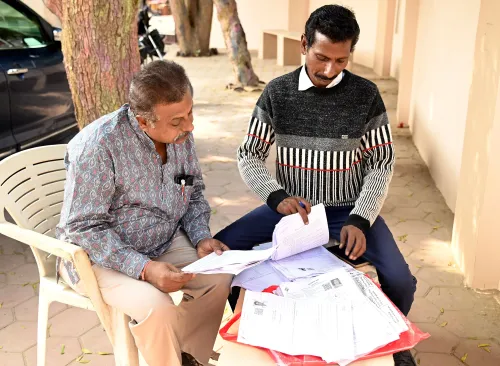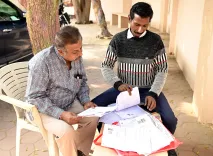How Did Saharsa Women Transform a Household Skill into a Successful Food Business?

Synopsis
Key Takeaways
- Empowerment: This story illustrates the power of women working together to create a successful business.
- Innovation: The integration of modern methods in traditional practices can lead to significant economic growth.
- Community Impact: Their enterprise is not only self-sustaining but also supports local employment.
- Government Support: Initiatives like PMFME can make a substantial difference in rural entrepreneurship.
- Quality Assurance: Innovations in production, like the sun-drying facility, enhance product quality.
Saharsa (Bihar), Aug 20 (NationPress) They say when positive thinking meets hard work, success becomes inevitable. In a heartwarming narrative of innovation deeply rooted in tradition, Basanti Kumari and her mother-in-law Lalita Devi, who reside in Ward 24, Patuaha under Saharsa Municipal Corporation, have turned a simple household skill into a flourishing small business—creating traditional “bari”.
What started as a family custom has evolved into a full-scale enterprise, yielding a monthly revenue of roughly Rs 1.5 lakh. Their accomplishment has been greatly enhanced with the assistance of the Pradhan Mantri Formalisation of Micro Food Processing Enterprises (PMFME) scheme, which provided them with Rs 10 lakh in financial aid to broaden their operations.
Basanti shared with IANS that her husband, Ratnesh Jaiswal, a food technologist associated with an NGO in Hyderabad, has also played a vital advisory role in developing their business. His technical knowledge, paired with Lalita Devi’s extensive experience in making traditional bari, has helped create a strong foundation for the venture.
Lalita Devi had been crafting and selling homemade bari—composed of urad dal, peas, and moong dal—since 1980. However, it was in October 2024, with Basanti's involvement, that the business was officially established and diversified.
Currently, they produce 12 distinct varieties of bari, such as: Masoor Bari, Urad Bari, Matar Bari, Chana Bari, Moong Bari, Mixed Dal Bari, Chana Garam Masala Mix Bari, Masoor Garam Masala Mix Bari, Urad Garam Masala Mix Bari, Beetroot Mix Bari, Ginger Mix Bari, and Carrot Mix Bari.
Their products now reach markets not only in Bihar but also extend to as far as South India, making the duo proud representatives of rural entrepreneurship.
More than just a family venture, their business is also creating jobs for others. Basanti and Lalita have employed six local women who earn daily wages by assisting in the production process. On average, the unit processes around 50 kilograms of raw materials daily, leading to a daily turnover of approximately Rs 5,000.
A significant innovation in their production has been the establishment of a sun-drying facility (“Suryakund”) in their backyard, constructed at a cost of Rs 5 lakh. This structure provides hygienic drying conditions, free from dust, insects, and interference from animals or birds—adding a layer of quality assurance to their products.
Basanti Kumari and Lalita Devi’s journey is much more than a business triumph—it represents a model of women’s empowerment, inter-generational collaboration, and self-sufficiency.
Transitioning from a kitchen corner to establishing a brand, this mother-in-law and daughter-in-law duo is demonstrating that traditional knowledge, when coupled with modern innovation and government backing, can lead to sustainable livelihoods. Their initiative serves as an inspiring example for rural women aspiring to achieve financial independence and self-employment.










